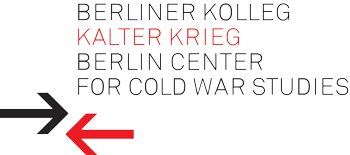The INF Treaty of 1987: A Re-Appraisal
International Conference in Berlin
By invitation only.
A public panel discussion in German "Der INF-Vertrag von 1987. Warum Abrüstung kein Hirngespinst ist" will take place at Humboldt University (Senatssaal) on November 30, 2017, at 7 pm. Please find the flyer here.
Convened by the Berlin Center for Cold War Studies, the Institute for Contemporary History Munich-Berlin, and the History Department at the University of Mannheim, with the generous support of the German Foundation für Peace Research, the Federal Chancellor Willy Brandt Foundation, and the Humboldt University Berlin.
For contemporaries, the events of December 1987 were little short of a miracle. After decades of an overheated arms race, the superpowers settled on the first disarmament treaty of the nuclear age.
 With the "Intermediate-Range Nuclear Forces Treaty" (INF-Treaty) of December 8th, 1987, the US and the USSR scrapped their European and Asian arsenal of missiles with a range of 500 to 5.500 km. It was the first disarmament treaty of the nuclear age. Most observers presumed that this step also signaled the beginning of the Cold War’s eventual demise. Recently, increasing Russian-American tensions have apparently undermined the treaty’s provisions. Based on recently declassified records, this international conference hopes to cast a new light on this chapter of the Cold War and to stimulate future research. Last but not least, it provides an opportunity to reflect on the future of arms control and disarmament.
With the "Intermediate-Range Nuclear Forces Treaty" (INF-Treaty) of December 8th, 1987, the US and the USSR scrapped their European and Asian arsenal of missiles with a range of 500 to 5.500 km. It was the first disarmament treaty of the nuclear age. Most observers presumed that this step also signaled the beginning of the Cold War’s eventual demise. Recently, increasing Russian-American tensions have apparently undermined the treaty’s provisions. Based on recently declassified records, this international conference hopes to cast a new light on this chapter of the Cold War and to stimulate future research. Last but not least, it provides an opportunity to reflect on the future of arms control and disarmament.
The conference will be held in English and is by invitation only. A public panel discussion in German – “Der INF Vertrag von 1987. Warum Abrüstung kein Hirngespinst ist” – will take place at Humboldt University Berlin (Senatssaal) on November 30, 2017, at 7 pm. Participants: PATRICIA FLOR, Federal Government Commissioner for Disarmament and Arms Control, Berlin, OLIVER MEIER, German Institute for International and Security Affairs, Berlin, OTFRIED NASSAUER, Berlin Information-center for Transatlantic Security, ANDREAS WIRSCHING, Institute for Contemporary History Munich – Berlin. Chair: BERND GREINER, Berlin Center for Cold War Studies.
Conference Program
Welcome Address
WOLFRAM HOPPENSTEDT, Federal Chancellor Willy Brandt Foundation
Opening Talk
The INF Treaty in Perspective
BERND GREINER, Berlin Center for Cold War Studies
Section I: Turning Points until 1985
At the Nadir: The Breakdown of the Geneva Talks and the Deployment of Missiles in East and West, 1979–1983
LEOPLODO NUTI, Roma Tre
Revisiting the Reagan Reversal: US Soviet Policy, 1984–1986
BETH A. FISCHER, University of Toronto
Turn of the tide: Gorbachev and the Change in the USSR’s Nuclear Policy, 1984/5–1986
TOM BLANTON, National Security Archive, Washington, DC
Chair: BERND ROTHER, Federal Chancellor Willy Brandt Foundation
Section II: Breakthrough to Disarmament: From Reykjavík to Washington, 1986–1987
The American Road to INF, 1986/87
RONALD J. GRANIERI, Foreign Policy Research Institute, Philadelphia
The Soviet Road to INF, 1986/87
SVETLANA SAVRANSKAYA, National Security Archive, Washington, DC
Chair: ARVID SCHORS, University of Freiburg
Section III: Socio-Political Dynamics, Peace Protests and Public Debates
The United States of America
CLAUDIA KEMPER, Hamburg Institute for Social Research
West Germany
PHILIPP GASSERT, University of Mannheim
"We just got to keep harping on about it." The INF Treaty in the Nordic Countries
TAPIO JUNTUNEN, University of Tampere
Chair: ELKE SEEFRIED, Institute for Contemporary History Munich – Berlin
Section IV: Reactions of the Western Allies
"Special no more?" Britain and the INF Treaty
OLIVER BARTON, UK Ministry of Defence, London
Ostpolitik à la française? France and the INF Treaty
CHRISTIAN WENKEL, Artois University, Arras
The Controversy Surrounding the Double-Zero Option: The Federal Republic of Germany and the INF Treaty
TIM GEIGER, Institute for Contemporary History Munich – Berlin
Chair: HÉLÈNE MIARD-DELACROIX, Sorbonne, Paris
Section V: Reactions of the Eastern Allies
Poland and the INF Treaty
WANDA JARZABEK, Polish Academy of Sciences, Warsaw
The GDR, Gorbachev, and the INF Treaty
HERMANN WENTKER, Institute for Contemporary History Munich – Berlin
Chair: AGNES BRESSELAU VON BRESSENSDORF, Institute for Contemporary History Munich – Berlin
Section VI: Realization of the Treaty
Implementing the Treaty, Dismantling the Missiles: When, Where and How?
WILLIAM ALBERQUE, NATO, Brussels
"The Left-Overs": From INF to START and CSE
OLIVER BANGE, University of Mannheim
Chair: PHILIPP GASSERT, University of Mannheim
Final Discussion
PHILIPP GASSERT, University of Mannheim
TIM GEIGER Institute for Contemporary History Munich – Berlin
BERND GREINER, Berlin Center for Cold War Studies
HERMANN WENTKER, Institute for Contemporary History Munich – Berlin
Chair: CLAUDIA KEMPER, Hamburg Institute for Social Research
Mit: William


